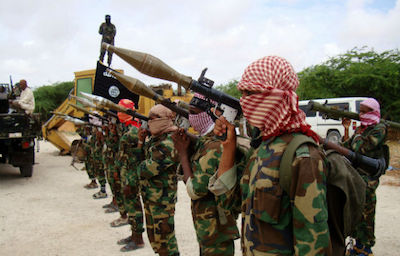
After Jenna Jordan graduated in 1999 with a degree in international relations from Mills College in her home town of Oakland, Calif., she enrolled at Stanford for a master's in political science. All the while, she worked as the owner-operator of a women's clothing store in San Francisco.
It was at Stanford that Jordan decided a career in academia would be more fulfilling than the apparel business. She could pursue a longtime interest in global politics, although her specific area of research remained something of an open question. Jordan would soon close her clothing store and go on to the University of Chicago for a second master's (2004) and a Ph.D. (2011) in political science. Two weeks in to graduate school at Stanford, on Sept. 11, 2001, she discovered a direction for her research.
9/11
I was already working on a thesis topic — forced population transfers and people's attachment to their land, which I'm still interested in — when 9-11 happened. It was a very intense time. The attacks and the subsequent events surrounding them changed the framework for how we think about international politics. They forced us to recognize that non-state actors can be influential and affect foreign and domestic policy in profound ways.
After taking a class on terrorism, I came away convinced that this was a new area of research that I could contribute to in some way. The particular area I'm interested in is if and when targeting the leadership of terrorist groups is effective.
I've written some articles on the subject (available in the favorite links box, left), and right now I'm going through the data again to prepare a book.
Research Conclusions
I argue that targeting the leadership of terrorist organizations is not an effective counterterrorism strategy in every case.
This strategy can be effective against certain kinds of newly established groups, like the left-wing Marxist groups active in the '70s and '80s. But the kinds of groups we're targeting now, large separatist or religious organizations like Al Qaeda, tend to be remarkably resilient.
Though killing or capturing the leaders might weaken their organizations in the short term, it is not going to cause them to fall apart. Terrorist organizations have an ability to re-group and learn and adapt and can be pretty resilient in a forceful way to the loss of their leadership.
Organization Resilience
 The resilience of these organizations has a lot to do with the amount of support these groups have in the communities in which they're operating. It also has to do with organizational structure — whether they have the kind of bureaucratic structure in place that makes them resilient to external shocks.
The resilience of these organizations has a lot to do with the amount of support these groups have in the communities in which they're operating. It also has to do with organizational structure — whether they have the kind of bureaucratic structure in place that makes them resilient to external shocks.
In some ways, Al Qaeda has the features of what we think of as a traditional bureaucracy: rosters, lists of responsibilities and duties, records of who is involved, and how much they are getting paid. At the same time it's also very decentralized, which challenges our notions of traditional organizational structure.
Hierarchical features operating at a decentralized level make these groups difficult to destabilize.
About the Research
Few people in academia are looking at this particular question. Policy makers continue to focus on leadership decapitation as a large part of our counterterrorism policy, so most people in the policy world think it is effective.
Ideally, this research would be useful for policy makers to re-examine their assumptions about the effectiveness of leadership decapitation. That's what motivates me, because I think policy should be relevant. But it doesn't look like our approach to counterterrorism is going to be changing anytime soon.
My research is interdisciplinary, drawing heavily on political science, but also from sociology to try to understand group structure, social movements and how people in communities relate to organizations. There are connections with people in computing and also with industrial systems and engineering for network analysis and optimization.
One of the things my research teaches students is that it's possible to do theoretically grounded work that also has relevance in the real world. When they look at a combination of theory and fact, it helps them understand how theory forces us to ask different questions and understand variations in outcomes or situations, which is what international affairs is all about.
Atlanta and Georgia Tech
Moving to Atlanta has been a big, big change, but I'm really enjoying it. I've met some great people — people are very nice down here, very friendly.
Georgia Tech is a terrific school, and the students here are amazing. I've been blown away by the quality of the students at Georgia Tech. It has far exceeded my expectations.
About Jenna Jordan
Assistant Professor, School of International Affairs
Jenna Jordan received her Ph.D. in political science from the University of Chicago and M.A. in Political Science from Stanford University. She previously held a post-doctoral research fellowship at the Harris School of Public Policy Studies at the University of Chicago. Her research interests include terrorism, population transfers, attachment to territory, and international security.
